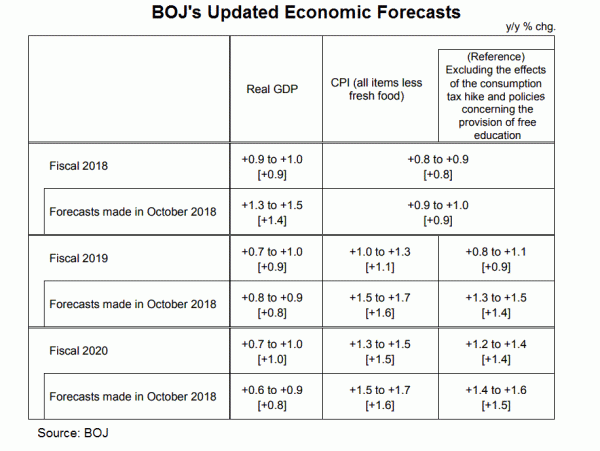As widely anticipated, BOJ voted 7-2 to leave left the policy rate unchanged at -0.1% in January. All other policies also remained intact: purchases of JGBs at a pace of 80 trillion yen/ year and maintenance of 10-year JGB yield at 0%, with trading band at +0.2% and – 0.2% (yield curve control). Meanwhile, BOJ has extended the deadline for new applications for lending scheme for a year – to end-March 2024, so as to encourage financial institutions to lend more. While the forward guidance stayed unchanged, it revised lower the GDP growth and inflation forecast. Despite the significant downward revision on inflation, we believe that BOJ is not dovish enough. We find that it has not taken into account the negative impact on upcoming VAT hike. Given the sluggishness in economic growth outlook, both at home and globally, we do not feel surprised if BOJ announce more unconventional stimulus. What is doubtful is the effectiveness of these measures.
On the updated economic forecasts, BOJ’s median inflation (less fresh food) forecast was revised lower to +0.9% for fiscal 2019, from +1.4% projected in October. This marks only mild improvement from +0.8% (Oct’s forecast: +0.9%) from fiscal 2018. CPI would then accelerate to +1.4% in fiscal 2020, compared with October’s estimate of +1.5%.
According to BOJ, the downside revision of CPI for fiscal 2019 is “due primarily to the decline in crude oil prices”. On economic growth, the median real GDP is expected to growth by +0.9% fiscal 2019, up from +0.8% projected in October. Growth would climb slightly higher to +1% (Oct: +0.8%) in fiscal 2020.
As suggested in the economic statement, BOJ noted that the VAT hike would affect the GDP growth rates in the following ways: 1) the front-loaded increase and subsequent decline in demand prior to and after the consumption tax hike and 2) a decline in real income. It added that “the negative impact on the growth rates is expected to be smaller than that on the rate for fiscal 2014, when the last consumption tax hike took place”. The VAT tax will increase from 8% to 10% in October 2019. In order to reduce the impact of the fiscal tightening, the government has planned to add stimulus worth of about 1.8 trillion yen to the market. The economic projections signal that BOJ expect VAT tax would help growth and stimulate inflation.
Theoretically, increase in sales tax should help boost inflation. Back in 2014, when the Japanese government increased the VAT to 8% from 5% in April that year, inflation rallied to 3.2% in the month from +1.3% in March. Inflation, however, peaked in May at +3.3%. Japan’s inflation fell below +0.5% again a year later as the VAT impact dissipated. Apart from the fact that Governor Haruhiko Kuroda expects that the impact this time would be milder, we are concerned that higher selling prices would restrain household spending, eventually forcing retailers to cut prices. This scenario is getting more likely as global economic growth in slowing down.
For traders: our Portfolio of forex robots for automated trading has low risk and stable profit. You can try to test results of our odin forex robot free download
Signal2forex review


 Signal2forex.com - Best Forex robots and signals
Signal2forex.com - Best Forex robots and signals




